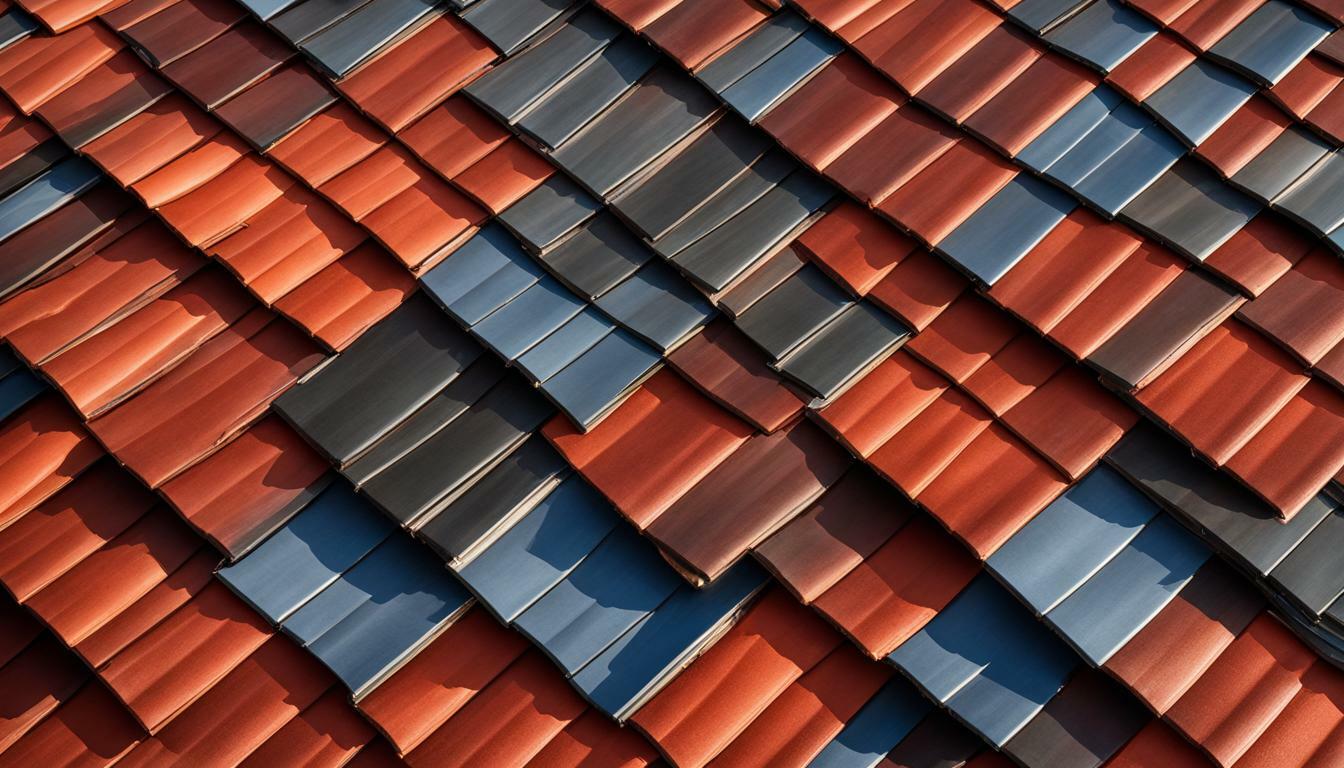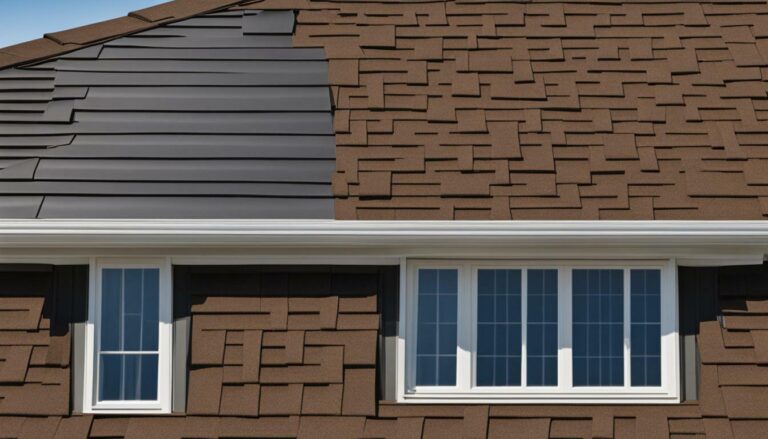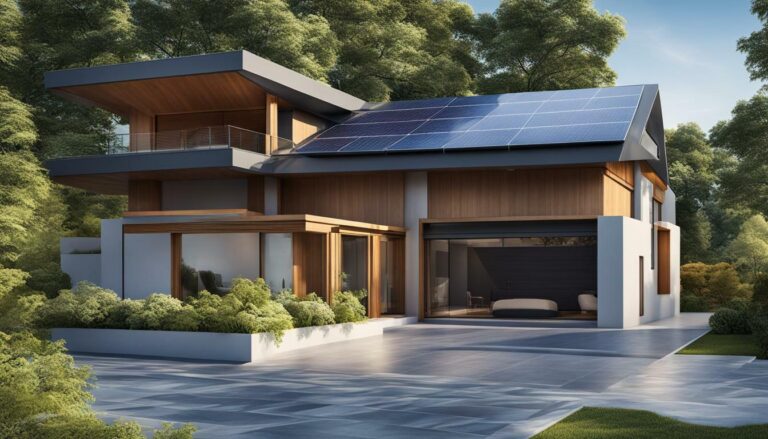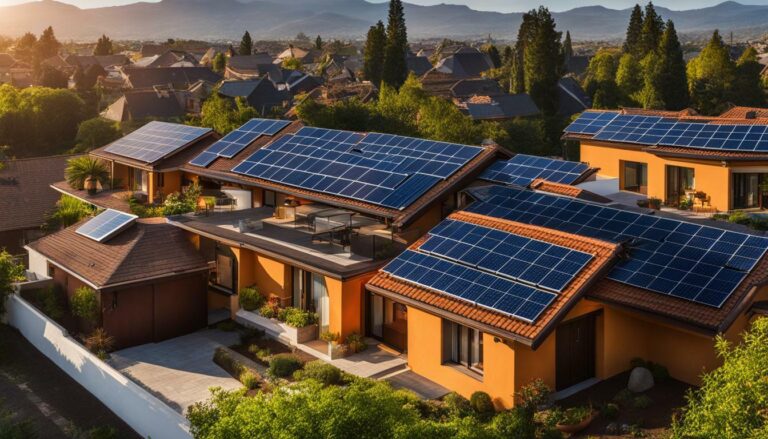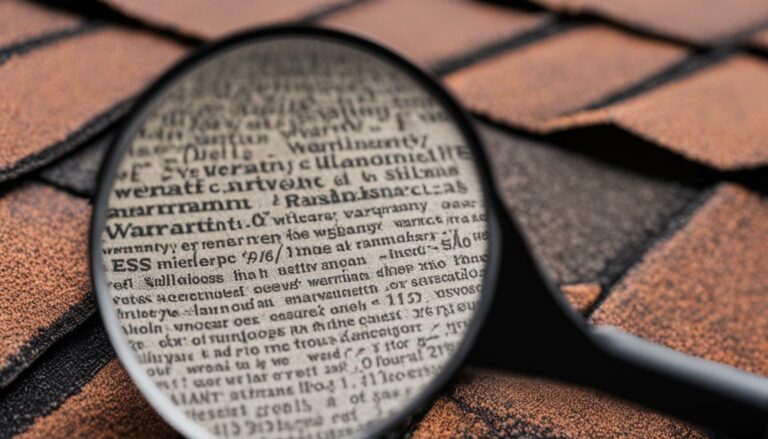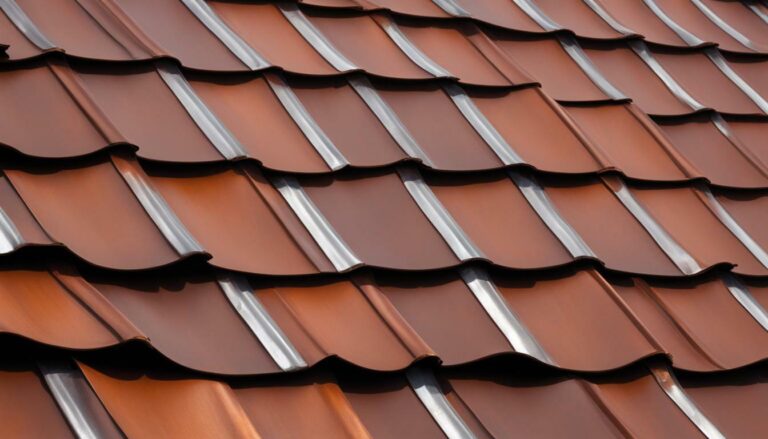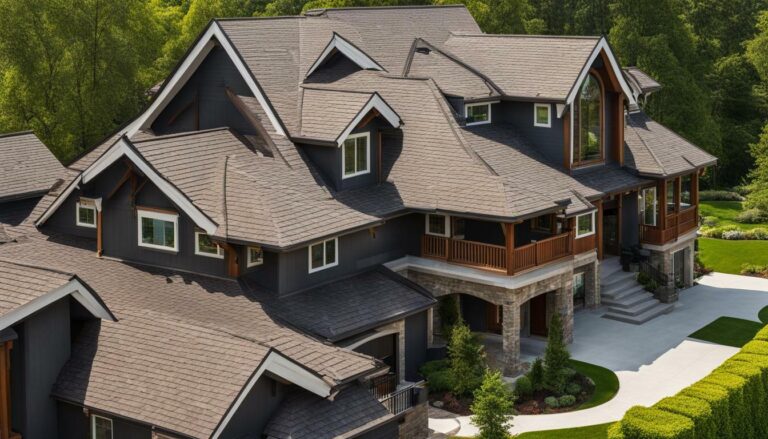Exploring Types of Roofing Materials: Your Comprehensive Guide
When it comes to choosing the right roofing materials for your home, there are numerous options to consider. The type of roof material you choose will have a significant impact on the overall look, durability, and performance of your roof. It’s important to make an informed decision based on your specific needs and preferences.
In this comprehensive guide, we will explore the different types of roofing materials available in the market today. From asphalt shingles to metal roofing, slate to tile, and flat to green roofing, we will discuss the benefits, considerations, and suitability of each material for different climates and preferences.
Key Takeaways:
- There are numerous types of roofing materials to choose from.
- Asphalt shingles are popular due to their affordability and versatility.
- Metal roofing offers durability and energy efficiency.
- Slate roofing is known for elegance and unmatched durability.
- Tile roofing is popular in hot climates but can be heavy and challenging to install.
Choosing the right roofing material involves considering factors such as climate, durability, cost, and aesthetics. It’s crucial to work with a qualified roofing contractor to ensure proper installation and maximize the longevity and performance of your roof.
Asphalt Shingles: Affordable and Versatile Roofing Option
Asphalt shingles are the go-to choice for many homeowners due to their affordability and versatility. They offer a cost-effective solution without compromising on quality or aesthetics. With a wide range of colors and styles available, asphalt shingles can complement any architectural design, making them a popular option for residential roofing projects.
One of the key advantages of asphalt shingles is their ease of installation. Whether you’re a seasoned DIY enthusiast or hiring a professional contractor, the installation process is straightforward and efficient. This saves both time and money, making it an attractive option for budget-conscious homeowners.
Another benefit of asphalt shingles is their durability. They can withstand various weather conditions, including strong winds and heavy rain, ensuring long-term protection for your home. Additionally, asphalt shingles are resistant to fire and algae growth, adding an extra layer of security and peace of mind.
| Advantages of Asphalt Shingles |
|---|
| Affordable |
| Versatile |
| Easy installation |
| Durable |
| Fire-resistant |
| Algae-resistant |
Asphalt shingles provide a cost-effective roofing solution that offers durability, versatility, and easy installation. They are an excellent choice for homeowners looking for an affordable and reliable option.
When considering roofing materials, it’s essential to weigh the pros and cons of each option. While asphalt shingles have many benefits, it’s important to consult with a qualified roofing contractor to determine the best choice for your specific needs. They can assess factors such as your climate, budget, and desired aesthetic to provide expert guidance and ensure a successful roofing project.
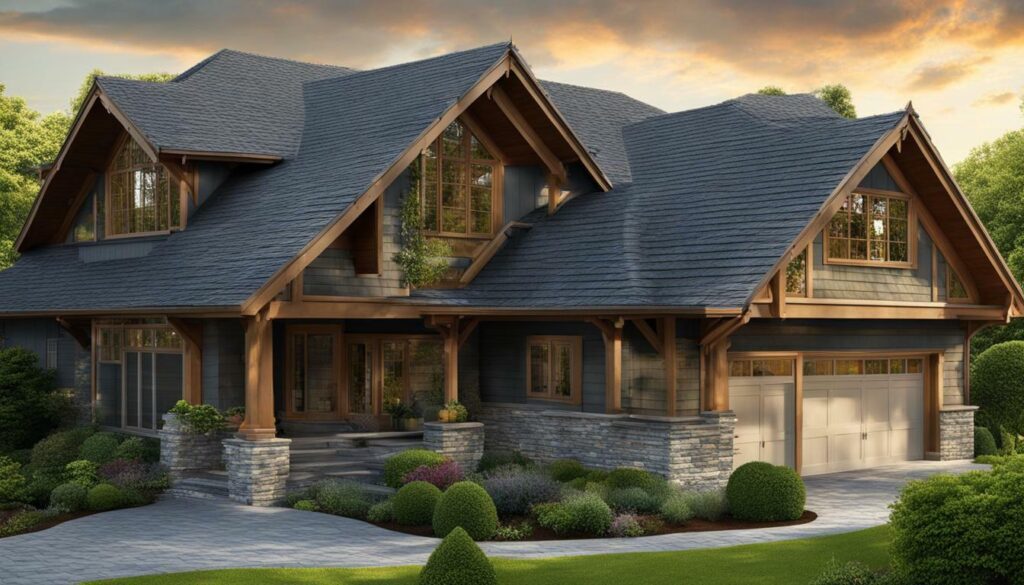
Summary
Asphalt shingles are a popular and versatile roofing option known for their affordability and ease of installation. With a wide range of colors and styles available, they can enhance the visual appeal of any home. In addition to being cost-effective, asphalt shingles are durable, fire-resistant, and algae-resistant, providing long-lasting protection for your roof. While asphalt shingles offer numerous advantages, it’s crucial to consult with a qualified roofing contractor to ensure the best choice for your specific needs.
Metal Roofing: Durable, Energy-Efficient, and Customizable
If you’re looking for a roofing material that offers unmatched durability, energy efficiency, and customizable options, metal roofing may be the perfect choice for you. Metal roofs have become increasingly popular in recent years, and for good reason. They are known for their longevity and ability to withstand harsh weather conditions, making them an excellent investment for homeowners.
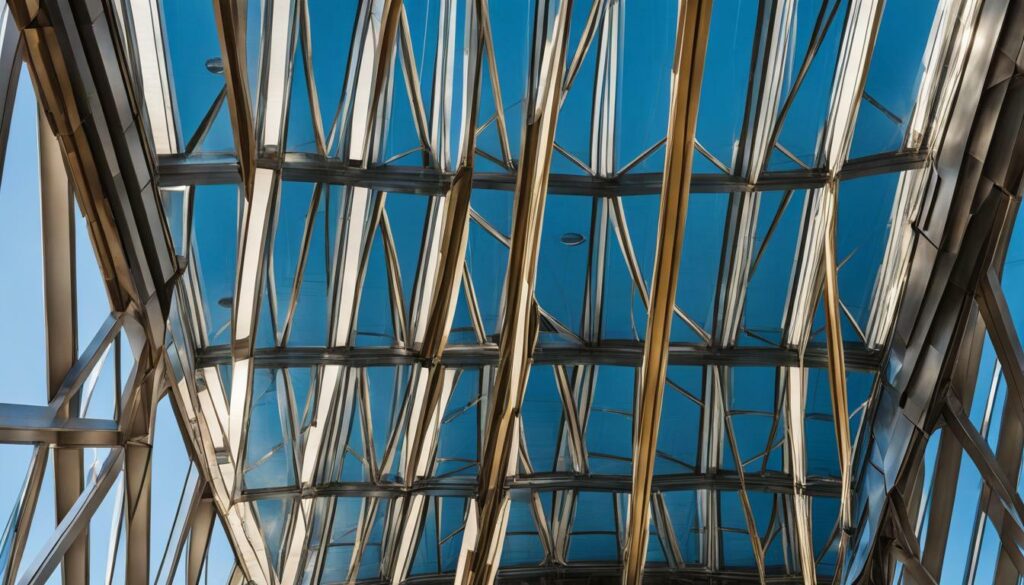
One of the key advantages of metal roofing is its durability. Metal roofs are highly resistant to damage from fire, hail, and high winds. They also have a long lifespan, often lasting 50 years or more with proper maintenance. This longevity makes metal roofing a cost-effective option in the long run, as it requires less frequent replacement compared to other materials.
In addition to durability, metal roofing is also known for its energy efficiency. Metal reflects heat from the sun, reducing the amount of heat transferred into your home. This can lead to lower cooling costs during hot summer months. Metal roofing materials can also be coated with reflective finishes that further enhance their energy-saving properties.
Furthermore, metal roofs offer a wide range of customization options to suit your aesthetic preferences. You can choose from various colors, finishes, and profiles to create a unique look for your home. Metal roofing can complement both traditional and modern architectural styles, adding value and curb appeal to your property.
Table: Metal Roofing Comparison
| Advantages | Considerations |
|---|---|
| Long lifespan | Higher upfront cost |
| Resistance to fire, hail, and high winds | Noisy during heavy rain or hail |
| Energy-efficient | Requires professional installation |
| Customizable options | May dent if struck forcefully |
When considering metal roofing, it’s important to consult with a qualified roofing contractor who can guide you through the selection and installation process. They can assess your specific needs, recommend the most suitable metal roofing materials, and ensure proper installation for optimal performance and longevity.
With its durability, energy efficiency, and customizable options, metal roofing offers a compelling choice for homeowners seeking a long-lasting and aesthetically pleasing roofing solution. Consider the advantages and considerations outlined above to make an informed decision that meets your needs and enhances the value of your home.
Slate Roofing: Timeless Elegance and Unmatched Durability
For homeowners seeking a roofing material that exudes timeless elegance and offers unmatched durability, slate roofing is an excellent choice. With its natural beauty and exceptional longevity, slate has been a popular roofing material for centuries. Its unique characteristics and benefits make it a top choice for those who value both style and performance.
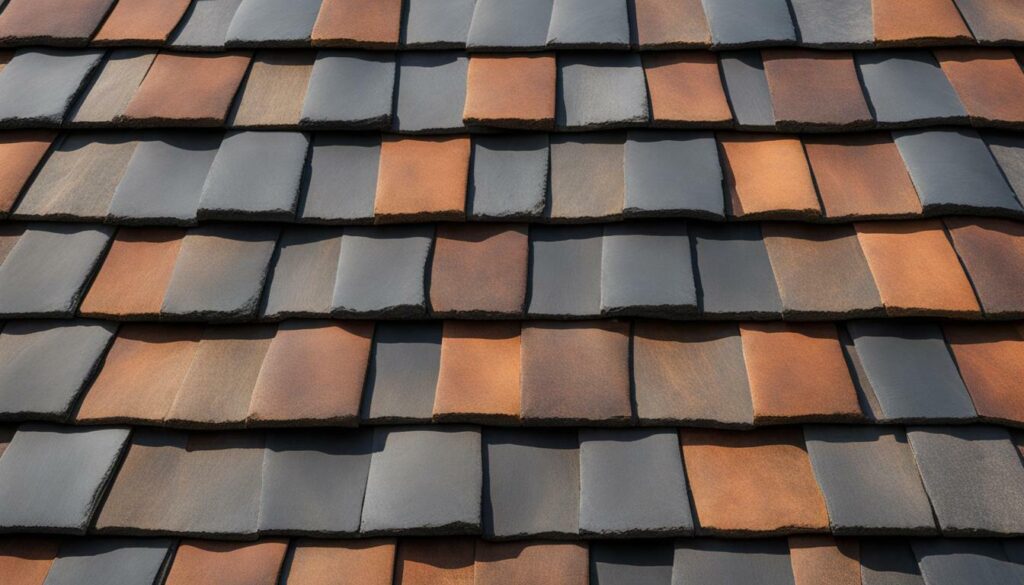
Slate is a natural stone that is quarried and shaped into individual tiles for use as roofing material. Its distinct colors, textures, and patterns create a stunning visual appeal that can enhance the overall aesthetics of any home. Whether you prefer a traditional or contemporary look, slate roofing offers a versatile range of options to suit various architectural styles.
Aside from its beauty, slate is highly durable and can withstand the elements for decades, if not centuries. It is resistant to fire, mold, and pests, making it an excellent choice for enhancing the structural integrity of your home. Additionally, slate roofing is known for its exceptional performance in extreme weather conditions, such as heavy rain, wind, and snow.
Slate Roofing Benefits:
- Durable roofing material that can last for generations
- Natural beauty and unique aesthetics
- Fire, mold, and pest resistance
- Superior performance in extreme weather conditions
While slate roofing offers numerous advantages, it’s important to note that it does come with some considerations. Due to its natural composition and specialized installation requirements, slate roofing can be relatively expensive compared to other roofing materials. Additionally, its weight may require additional structural support during installation.
To fully enjoy the benefits of slate roofing, it is recommended to work with a qualified roofing contractor who has experience with this material. They can provide expert installation services and ensure that your slate roof is properly installed for long-lasting performance and functionality.
When it comes to choosing a roofing material that combines timeless elegance with unmatched durability, slate roofing stands out as a top contender. Its natural beauty, exceptional longevity, and resistance to the elements make it a sound investment for homeowners seeking both style and substance. Consider exploring slate roofing as a premium option for your home’s protection and aesthetic appeal.
Tile Roofing: Popular Choice for Hot Climates
If you live in a hot climate and are looking for a roofing material that can withstand high temperatures, tile roofing may be the ideal option for you. Tiles are renowned for their ability to provide effective heat resistance, making them a popular choice in regions with scorching summers. Not only do they help to keep your home cool by reflecting the sun’s rays, but they also have excellent insulation properties, reducing the transfer of heat into the interior.
One of the key advantages of tile roofing is its durability. Unlike other roofing materials that may deteriorate over time due to constant exposure to high temperatures, tiles are known for their exceptional longevity. They are resistant to fire, rot, and insect damage, ensuring that your roof remains in excellent condition for years to come. Additionally, tile roofs require minimal maintenance, making them a cost-effective choice over the long term.
Tile roofing offers a wide range of styles and colors, allowing you to achieve a customized and aesthetically pleasing look for your home. From traditional terracotta and clay tiles to modern concrete and synthetic options, there are numerous choices available to suit your personal preferences and architectural style. Whether you prefer a sleek and contemporary appearance or a more rustic and timeless look, you can find the perfect tile roofing solution.
Table: Pros and Cons of Tile Roofing
| Pros | Cons |
|---|---|
| Excellent heat resistance and insulation properties | Heavy and may require additional structural support |
| Exceptional durability and longevity | Higher upfront cost compared to some other roofing materials |
| Wide range of styles and colors available | Complex installation process |
| Low maintenance requirements | Brittle nature may make tiles susceptible to cracking |
“Tile roofing provides excellent heat resistance and insulation, making it an ideal choice for hot climates. Its durability, wide range of styles, and low maintenance requirements are additional advantages. However, the weight of tiles may necessitate additional structural support, and the complex installation process should be carried out by a professional roofing contractor.”
Before deciding on tile roofing, it’s important to consider the weight of the tiles and ensure that your home’s structure can support the additional load. Additionally, the installation process requires expertise and precision to ensure a proper fit and long-lasting performance. Therefore, it is recommended to work with a qualified roofing contractor who has experience in installing tile roofs.
Overall, tile roofing is a popular choice for those living in hot climates due to its ability to withstand high temperatures, its durability, and its aesthetic appeal. Consider the benefits and drawbacks of tile roofing, along with your specific needs and budget, when making a decision about the right roofing material for your home.
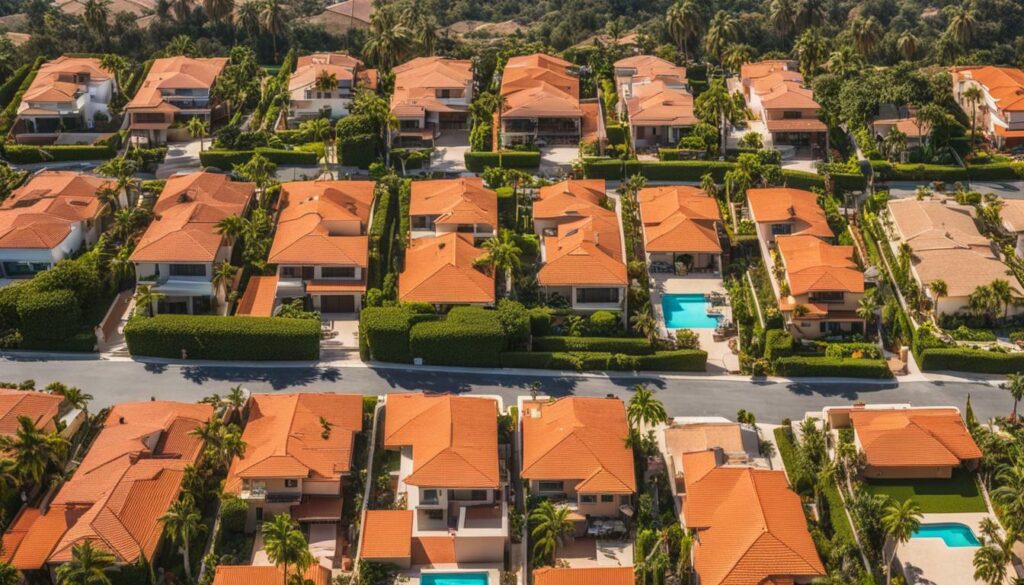
If you desire a modern and sleek look for your home, flat roofing can be an excellent choice, but it’s important to consider specific installation requirements and its compatibility with your local climate. Flat roofing offers distinct advantages in terms of aesthetics and functionality, making it a popular option for contemporary homes.
One of the main benefits of flat roofing is its clean and minimalist appearance. With its simple lines and smooth surface, flat roofs provide a sleek and modern look that complements various architectural styles. Whether your home has a minimalist design or a more contemporary aesthetic, a flat roof can enhance its overall appeal.
However, it’s crucial to note that flat roofing requires specialized installation to ensure its proper performance and longevity. Unlike sloped roofs, which allow rain and snow to naturally slide off, flat roofs need additional waterproofing measures to prevent water from pooling and causing damage. This involves the use of high-quality materials and expert craftsmanship during installation.
| Advantages of Flat Roofing | Considerations for Flat Roofing |
|---|---|
|
|
When selecting a flat roofing system, it’s crucial to consult with a professional roofing contractor experienced in flat roof installations. They can assess your specific needs, climate factors, and budget constraints to recommend the most suitable materials and ensure proper installation. With their expertise, you can avoid common pitfalls and ensure that your flat roof is built to withstand the demands of your environment.

In conclusion, flat roofing offers a modern and sleek option for homeowners seeking a contemporary look. However, its installation requirements and compatibility with your local climate should be carefully considered. By working with a qualified roofing contractor and choosing the right materials, you can enjoy the benefits of a flat roof while ensuring its long-term performance and durability.
Green Roofing: Eco-Friendly and Sustainable Roofing Option
If you’re passionate about sustainability and environmental friendliness, green roofing offers an eco-friendly and sustainable option for your home. Green roofing, also known as a “living roof,” involves covering the roof with vegetation, providing insulation and improving air quality. Not only does it enhance the aesthetic appeal of your property, but it also offers numerous benefits for both you and the environment.
A green roof consists of layers of materials, including a waterproof membrane, a root barrier, and a drainage layer, followed by a layer of soil and plants. It acts as a natural insulator, reducing heat transfer and energy consumption, thus lowering your utility bills. Additionally, green roofing helps to mitigate the heat island effect in urban areas, where temperatures can be significantly higher than in rural areas.
One of the key advantages of green roofing is its positive impact on the environment. The plants and soil help to filter out pollutants and reduce air pollution, improving the air quality around your home. They also absorb and retain rainwater, reducing stormwater runoff and alleviating strain on local stormwater management systems. Furthermore, green roofs provide habitat and food sources for birds, butterflies, and other pollinators, promoting biodiversity in urban settings.
It’s important to note that the installation and maintenance of green roofing should be carried out by professionals to ensure proper performance and longevity. The selection of appropriate plant species, irrigation systems, and regular inspections are crucial to the success of your green roof. Consulting with a qualified roofing contractor with experience in green roofing is highly recommended to ensure the best results for your eco-friendly roofing option.
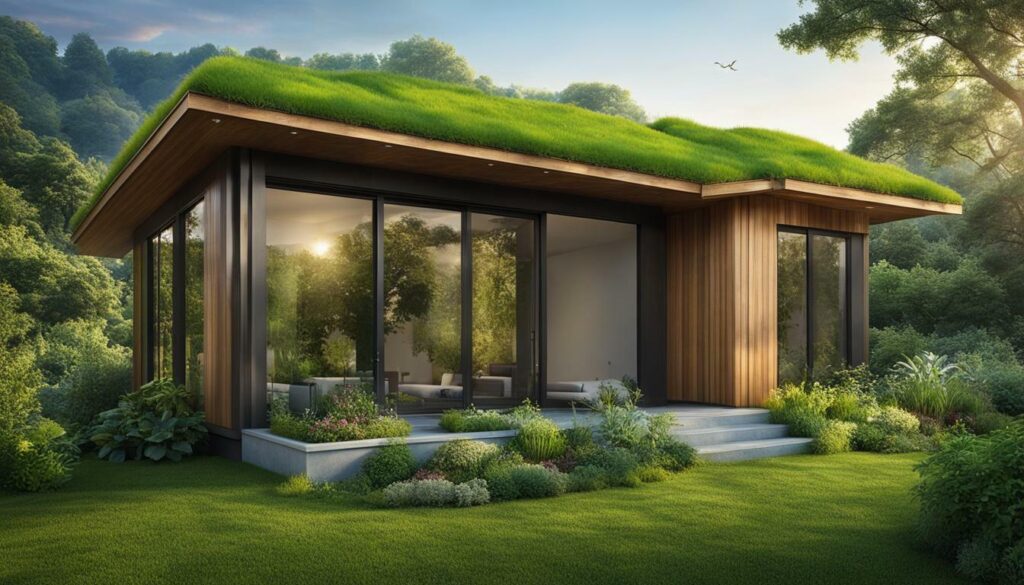
| Benefits of Green Roofing | Considerations for Green Roofing |
|---|---|
|
|
“A green roof consists of layers of materials, including a waterproof membrane, a root barrier, and a drainage layer, followed by a layer of soil and plants.”
Conclusion:
Green roofing provides an eco-friendly and sustainable option for homeowners who are committed to environmental preservation. By incorporating vegetation on your roof, you can enjoy benefits such as improved insulation, reduced energy consumption, enhanced air quality, and effective stormwater management. However, it’s essential to collaborate with qualified roofing contractors to ensure proper installation and ongoing maintenance for optimal performance. With the right expertise and attention, green roofing can be a beautiful and environmentally conscious addition to your home.
Considerations for Choosing the Right Roofing Material
Selecting the right roofing material for your home involves considering various factors that can greatly impact its performance and your satisfaction as a homeowner. Climate is one of the most significant factors to consider. Different roofing materials have varying levels of resistance to extreme weather conditions, such as high winds, heavy rain, or intense heat. For example, asphalt shingles are a popular choice for their ability to withstand harsh weather conditions. Metal roofing, on the other hand, offers excellent durability and resistance to fire, making it a suitable option for areas prone to wildfires.
Durability is another crucial consideration. A durable roofing material can protect your home from the elements and stand the test of time. Slate roofing is known for its exceptional durability, with a lifespan that can surpass a century. However, it should be noted that some roofing materials may require more maintenance and regular inspections to ensure their longevity. Metal roofing, for instance, may need occasional repainting or coating to preserve its appearance and prevent corrosion.
Cost is an essential factor in any home improvement project, and roofing is no exception. The initial cost of the roofing material, as well as the long-term maintenance and repair expenses, should be taken into account. Some materials, like asphalt shingles, offer a cost-effective option, while others, like slate or tile roofing, can be more expensive upfront. It is important to weigh the cost against the expected lifespan and performance of the material. Consulting with a roofing contractor can provide valuable insights into the overall cost considerations.
Aesthetics also play a significant role in choosing the right roofing material. The roof is a prominent feature of your home’s exterior and can greatly impact its overall appearance. Many roofing materials come in a variety of colors, styles, and textures, allowing you to find a roofing material that complements your home’s architectural style and personal preferences. Whether you prefer the classic look of slate or the sleek modernity of metal, there are numerous options available to suit your aesthetic vision.
| Factors to Consider when Choosing a Roofing Material: |
|---|
| Climate |
| Durability |
| Cost |
| Aesthetics |
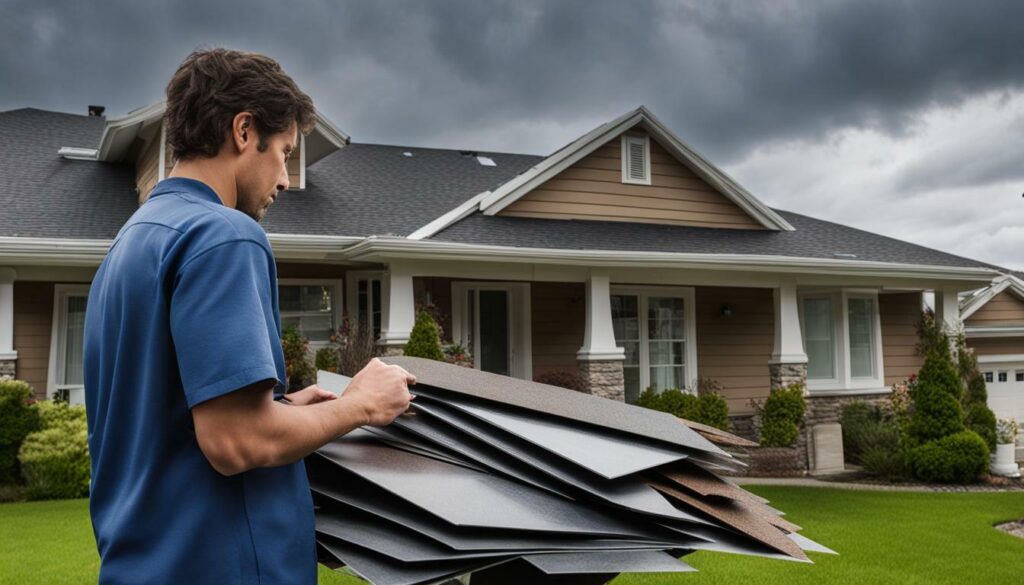
“When choosing the right roofing material, it’s important to strike a balance between functionality, durability, and aesthetics. Consider your local climate, the expected lifespan of the material, and the overall look you desire for your home. Consulting with a professional roofing contractor can help you make an informed decision and ensure a successful installation.”
In summary, selecting the right roofing material is a significant decision that requires careful consideration. Factors such as climate, durability, cost, and aesthetics should all be taken into account. By evaluating these factors and consulting with a qualified roofing contractor, you can make an informed decision that will protect your home and meet your specific needs. Remember, investing in a high-quality roofing material and professional installation is vital for ensuring the longevity and performance of your roof.
Professional Installation: Ensuring a Properly Installed Roof
When it comes to installing your new roof, it is crucial to work with a qualified roofing contractor to ensure proper installation and optimal performance. Professional installation not only guarantees that your roof is installed correctly but also provides a range of other benefits.
First and foremost, a qualified roofing contractor has the knowledge and expertise to handle the installation process efficiently and safely. They understand the complexities involved in working with different roofing materials and can navigate potential challenges with ease. Whether you have chosen asphalt shingles, metal roofing, slate, tile, flat, or green roofing, a professional will ensure that the installation is done according to industry standards and local building codes.
Furthermore, professional installation often comes with warranties that provide you with peace of mind. Roofing materials typically come with manufacturers’ warranties, but these warranties may be voided if the installation is not done by a qualified contractor. By hiring a professional, you can be confident that your warranty will remain valid, protecting you from unexpected repair costs in the future.
Finally, a qualified roofing contractor can help you achieve the best performance and longevity from your roof. They will make sure that all the necessary steps, such as proper insulation, ventilation, and waterproofing, are taken during the installation process. This attention to detail will extend the lifespan of your roof, saving you money in the long run.
| Benefits of Professional Installation: |
|---|
| Efficiency and Safety: Qualified contractors have the knowledge and expertise to handle the installation process efficiently and safely. |
| Warranty Coverage: Professional installation ensures that your warranty remains valid, protecting you from unexpected repair costs. |
| Optimal Performance: A qualified contractor will make sure all necessary steps are taken during installation to achieve the best performance and longevity from your roof. |
“Hiring a professional roofing contractor is essential to ensure the proper installation of your new roof. Their expertise and attention to detail will provide you with a roof that performs well and lasts for years to come.”
When choosing a roofing contractor, be sure to do your research and select a reputable and experienced professional. Look for certifications, licenses, and positive reviews from previous customers. This will help ensure that you are working with a qualified contractor who will deliver high-quality workmanship and excellent customer service.
In conclusion, professional installation is essential for ensuring a properly installed roof that performs well and stands the test of time. By working with a qualified roofing contractor, you can have confidence in the installation process and enjoy the long-term benefits of a well-installed roof.
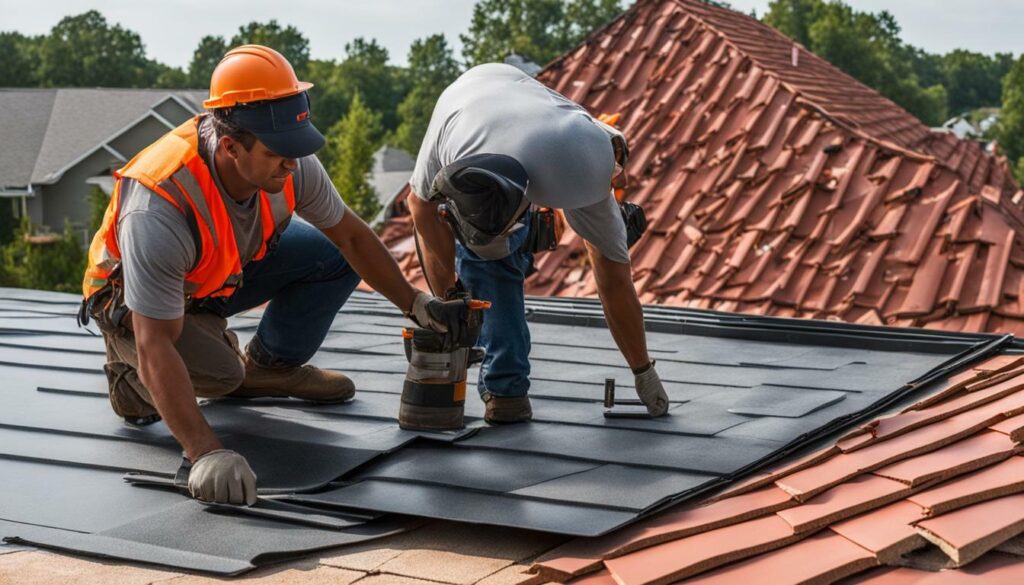
With a wide range of roofing materials available, it’s essential to consider factors such as durability, cost, climate suitability, and aesthetics to choose the right option for your home. Asphalt shingles are a popular choice due to their affordability, ease of installation, and versatility in colors and styles. Metal roofing is gaining popularity for its durability, energy efficiency, and customizable options. Slate roofing offers unmatched durability and a timeless, elegant look, but it can be costly and requires specialized installation.
Tile roofing is another popular choice, especially in hot climates, as it can withstand high temperatures. However, it can be heavy and challenging to install. Flat roofing, although modern and sleek, requires specialized installation and is not recommended for areas with heavy snow or rain. Green roofing, also known as a “living roof,” provides eco-friendly benefits, including insulation and improved air quality, but it requires professional installation and maintenance.
When choosing the right roofing material, it’s crucial to consider the specific climate, desired durability, budget, and aesthetic preferences. Consulting with a qualified roofing contractor is highly recommended to ensure proper installation and maximize the longevity and performance of your roof. By making an informed decision and working with professionals, you can select the ideal roofing material that will protect your home and enhance its overall appearance.
FAQ
Q: What are the different types of roofing materials?
A: The different types of roofing materials include asphalt shingles, metal roofing, slate roofing, tile roofing, flat roofing, and green roofing.
Q: Why are asphalt shingles popular?
A: Asphalt shingles are popular due to their affordability, ease of installation, and wide range of colors and styles.
Q: What are the benefits of metal roofing?
A: Metal roofing is durable, energy-efficient, and customizable, making it a popular choice among homeowners.
Q: What are the advantages of slate roofing?
A: Slate roofing offers unmatched durability and a timeless, elegant look. However, it can be expensive and requires specialized installation.
Q: Why is tile roofing popular in hot climates?
A: Tile roofing is a popular choice in hot climates due to its ability to withstand high temperatures. However, it can be heavy and difficult to install.
Q: What are the considerations for flat roofing?
A: Flat roofing is a modern and sleek option, but it requires specialized installation and is not recommended in areas with heavy snow or rain.
Q: What is green roofing?
A: Green roofing, also known as a “living roof,” involves covering the roof with vegetation. It provides insulation, improves air quality, and is eco-friendly.
Q: What factors should I consider when choosing a roofing material?
A: When choosing a roofing material, it is important to consider factors such as climate, durability, cost, and aesthetics.
Q: Why is professional installation important?
A: Professional installation is important to ensure proper installation, adherence to building codes, and the longevity and performance of the roof.
